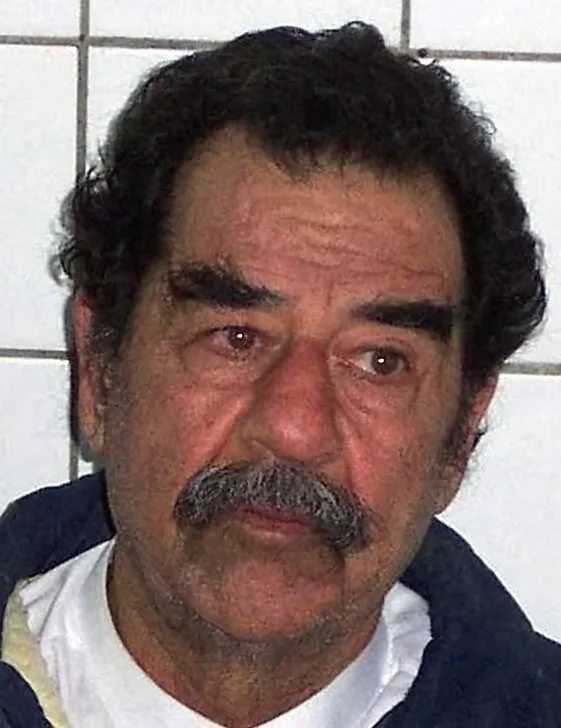US DoD Photo, Public domain, via Wikimedia Commons
Why we think Saddam Hussein is a Type 8
Authoritarian and dictatorial: Hussein ruled Iraq with an iron fist, consolidating power through purges and extreme loyalty tests. He was intolerant of dissent and used intimidation, torture, and executions as tools to maintain his power and suppress any form of opposition. Personal accounts from bodyguards and other officials described him as being direct, domineering, and decisive.
Intense fear of being betrayed: As his rule progressed, he became increasingly suspicious of those around him, including his closest allies and family members. This paranoia led to purges of the military and government, where real or perceived opponents were swiftly dealt with. In 1982, after an assassination attempt on his life in the town of Dujail, his retaliation was swift and brutal. Hundreds were executed, and many more were imprisoned or exiled.
Ruthless elimination of opponents: In the late 1970s, in a bid to consolidate his power, Hussein conducted a purge within the Ba'ath Party. During a party meeting, he personally read out the names of members he claimed were traitors. Those named were taken out of the room and later executed.
Creating an image of power. Hussein held referendums in which he was the only candidate, and unsurprisingly, he would "win" with over 99% of the vote. This was a control mechanism to maintain the illusion of popular support.
Dominance in personal interactions: Many accounts of personal interactions with Hussein, whether from diplomats or defectors, depict him as a dominant figure, keen to establish his authority in every situation. For example, an ex-official of his government who defected shared an account of a cabinet meeting where Hussein accused one minister of treason and, without waiting for an explanation or defense, ordered the arrest and execution of the accused.
Demanding respect. Even during his imprisonment, Hussein maintained his dominative behavior, according to prison guards. Instead of showing submission or remorse, he would argue about his innocence and justify his actions. He also made his expectations clear about the respect he deserved from the prison staff. In many instances, he refused meals, asserting control and dominance over basic aspects of his life in prison.
Physical displays of strength and protection. While Iraqis suffered from economic hardships and sanctions, Hussein built numerous palaces around the country. This not only served as a display of his personal power and wealth but also as fortified locations that he believed would protect him.
Wars of aggression: His style was very confrontational, especially with perceived enemies. His decisions to wage war on Iran in 1980 and to invade Kuwait in 1990 were driven by a mix of territorial ambitions and a desire to assert Iraq's dominance in the region.
Identity of a protector: Hussein framed his actions in the context of Arab nationalism and the broader pan-Arab cause. He positioned himself as a champion for Arab unity and as a bulwark against perceived threats from Israel and the West.
Refusal to give up power: Especially in the face of international pressure, he exhibited a defiant stance. For instance, during the 2003 invasion of Iraq by U.S.-led coalition forces, he continued to broadcast messages of resistance and determination against what he termed as "foreign invaders.” Despite international pressure, economic sanctions, and threats of invasion, he refused to step down or significantly alter his policies.
Cult of personality: Hussein went to great lengths to establish a cult of personality around himself. Statues, portraits, and various forms of propaganda presented him as a father figure, war hero, and the savior of the Iraqi people.
Saddam Hussein quotes that show he is a Type 8
“Whoever tries to climb over our fence, we will try to climb over his house. ”
“I like to call a spade a spade in politics and in everything else.”
“He who smelled the rifle is one, he who watched Rambo is another.”
“The forces of evil will carry their coffins on their backs, die in disgraceful failure, taking their schemes back with them, or digging their own graves.”
“Put your minds at ease that I rarely find it difficult to sleep ... I fall asleep as soon as I put my head on the pillow. I don’t need sleeping pills, unlike some officials we hear about, and I don’t get insomnia like some people do.”
"I am not going to answer to this so-called court, out of respect for the truth and the will of the Iraqi people. I am the president of Iraq and the occupier has used its verdict to topple me."
"We are ready to sacrifice our souls, our children, and our families so as not to give up Iraq."
"You Americans, you treat the Third World in the way an Iraqi peasant treats his new bride. Three days of honeymoon, and then it's off to the fields."
"The U.N. is a place for prostitution under the feet of Americans."
"Long live the nation! Death to the enemies of the nation!”
"The mother of all battles has begun. The dawn of victory nears as this great showdown begins!"
"We are not intimidated by the size of the armies, or the type of hardware the U.S. has brought."

